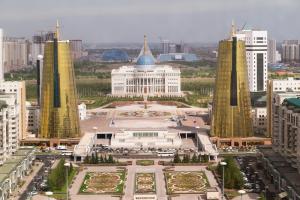UNECE and the QazTrade Center for Trade Policy Development are joining forces to advance sustainable trade and the circular economy in Kazakhstan. Kazakhstan is the first country in Central Asia to use the SPECA Principles of Sustainable Trade - a set of twenty principles, adopted by the countries participating in the United Nations Special Programme for Economies in Central Asia (SPECA) - in its sustainable development plans. The country’s sustainability objectives are defined in its Strategic Development Plan until 2025 and the “Kazakhstan-2050” Strategy.
On 21 November 2022, QazTrade and UNECE trained stakeholders for the first time on the promotion of sustainable trade, with a focus on the application of the SPECA Principles for Sustainable Trade. Ms Aliya Alimbetova, Director of the Foreign Trade Activities Department of the Ministry of Trade and Integration of Kazakhstan, noted that this joint activity builds on many years of fruitful cooperation with UNECE.
The training touched upon the following issues: sustainable trade with an analysis of business processes of grain and fruit exports; rationalizing trade flows in Central Asia to support more efficient and sustainable water resource management; production and trade in agricultural products; food security; and the circular economy. Stakeholders welcomed the opportunity to discuss synergies among these subjects, as cross-cutting expertise is needed to advance these seemingly unrelated areas.
One of the sessions was dedicated to the circular transition in Kazakhstan. Participants discussed the state of play of circularity, effective UNECE solutions and prospective priority areas to support Kazakhstan’s efforts in this area. In June 2022 the President of the Republic announced that Kazakhstan should seriously consider the prospects of implementing the principles of the circular economy, especially in industry and agriculture. Some of the circular economy principles are already reflected in the National Development Plan of the Republic of Kazakhstan until 2025. Under the coordination of the Ministry of Ecology, Geology and Natural Resources, the government has also introduced a new Ecological Code in 2021, established a waste classifier and extended producer responsibility.
In recent years, SWITCH Asia – an EU-funded initiative for sustainable consumption and production (SCP) in the region – has significantly contributed to promoting circularity in Kazakhstan. This includes, in particular, the development of a National SCP Action Plan.
The results of the training session provided solid ground for the launch of national activities in Kazakhstan under the UNECE project “Accelerating the transition to a circular economy in the UNECE region”. UNECE invited national stakeholders to join Circular STEP – UNECE multistakeholder knowledge sharing network – to benefit from cross-cutting regional activities and practical tools in trade and economic cooperation for the circular transition.
Participants discussed the linkages between sustainable trade, sustainable water management and food security in the SPECA region. Identifying possible actions for a Roadmap on the application of the SPECA Principles on Sustainable Trade is an essential part of the discussion on next steps.
